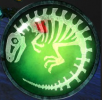Difference between revisions of "Health"
Bermudabeast (talk | contribs) |
(The shape of the silhouette doesn't actually change based on which creature you are playing. Shortened some sentences) |
||
| (7 intermediate revisions by 2 users not shown) | |||
| Line 1: | Line 1: | ||
| − | [[ | + | HP stands for Health Points. Every creature in Beasts of Bermuda has HP, represented as a [[User Interface|silhouette]] located in the bottom-right corner of the screen. The silhouette changes color based on [[Comfort|comfort]], and the capacity changes based on current HP. |
| − | + | In general, larger creatures have more HP than smaller ones. The primary means by which a player can lose HP is through combat, though poor health due to dehydration, hunger, or stress can also drop HP. When HP drops to zero, a creature will die. | |
| + | |||
| + | [[File:Capture.png|x100px|border|]] | ||
Many factors influence how quickly a creature will recover lost HP. | Many factors influence how quickly a creature will recover lost HP. | ||
| − | *[[Thirst]] plays a significant role in how quickly one recovers HP. A completely dehydrated creature will lose 10% of their HP every 5 seconds. | + | *[[Comfort]] is the main influence for HP regeneration. Low levels of comfort will cause HP to decay, while high levels comfort rapidly improve HP regeneration. |
| − | *[[ | + | *[[Thirst]] plays a significant role in how quickly one recovers HP, as hydrated creatures regenerate HP faster. A completely dehydrated creature will lose 10% of their HP every 5 seconds. For Aquatic creatures, Thirst is replaced with the Oxygen stat, but has identical mechanics tied with HP regeneration. |
| − | + | *[[Food]] plays a similar and equally significant role in how quickly one recovers HP, as well-fed creatures regenerate HP faster, though at the cost of discomfort due to over-eating. A starving creature will lose 10% of their HP every 5 seconds. | |
*Different creatures have different baseline rates at which they recover HP. | *Different creatures have different baseline rates at which they recover HP. | ||
*Having low thirst and hunger simultaneously can result in HP decay, even if neither resource is completely empty, especially if the creature has lower comfort. | *Having low thirst and hunger simultaneously can result in HP decay, even if neither resource is completely empty, especially if the creature has lower comfort. | ||
| + | *[[Resting]] will greatly increase the rate at which a player recovers lost HP. | ||
There is currently only one method in which a player can increase their maximum HP. If a player consumes [[Food|food]] while full, they will [[Weight Gain|gain weight]]. Weight gain changes many aspects of a creature's stats and behavior, including temporarily, modestly raising the max HP. | There is currently only one method in which a player can increase their maximum HP. If a player consumes [[Food|food]] while full, they will [[Weight Gain|gain weight]]. Weight gain changes many aspects of a creature's stats and behavior, including temporarily, modestly raising the max HP. | ||
Latest revision as of 10:50, 3 August 2020
HP stands for Health Points. Every creature in Beasts of Bermuda has HP, represented as a silhouette located in the bottom-right corner of the screen. The silhouette changes color based on comfort, and the capacity changes based on current HP.
In general, larger creatures have more HP than smaller ones. The primary means by which a player can lose HP is through combat, though poor health due to dehydration, hunger, or stress can also drop HP. When HP drops to zero, a creature will die.
Many factors influence how quickly a creature will recover lost HP.
- Comfort is the main influence for HP regeneration. Low levels of comfort will cause HP to decay, while high levels comfort rapidly improve HP regeneration.
- Thirst plays a significant role in how quickly one recovers HP, as hydrated creatures regenerate HP faster. A completely dehydrated creature will lose 10% of their HP every 5 seconds. For Aquatic creatures, Thirst is replaced with the Oxygen stat, but has identical mechanics tied with HP regeneration.
- Food plays a similar and equally significant role in how quickly one recovers HP, as well-fed creatures regenerate HP faster, though at the cost of discomfort due to over-eating. A starving creature will lose 10% of their HP every 5 seconds.
- Different creatures have different baseline rates at which they recover HP.
- Having low thirst and hunger simultaneously can result in HP decay, even if neither resource is completely empty, especially if the creature has lower comfort.
- Resting will greatly increase the rate at which a player recovers lost HP.
There is currently only one method in which a player can increase their maximum HP. If a player consumes food while full, they will gain weight. Weight gain changes many aspects of a creature's stats and behavior, including temporarily, modestly raising the max HP.
